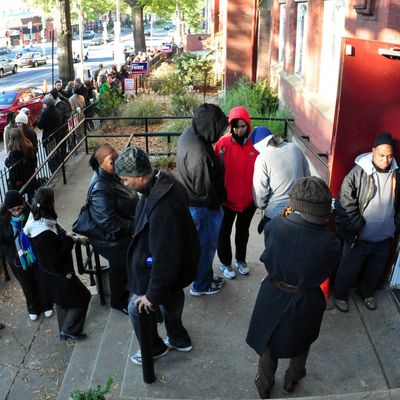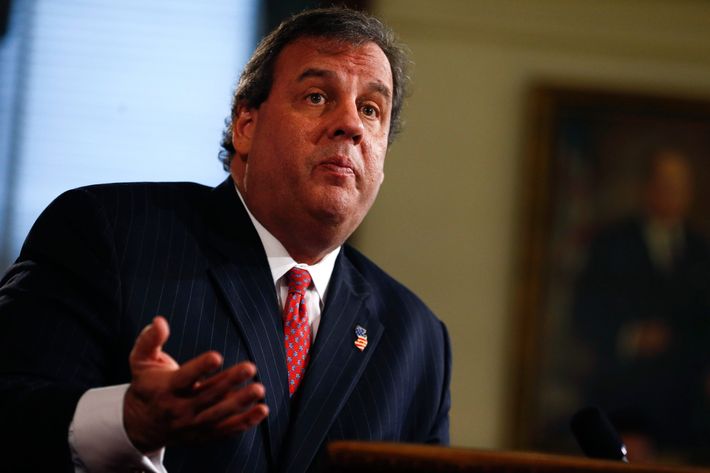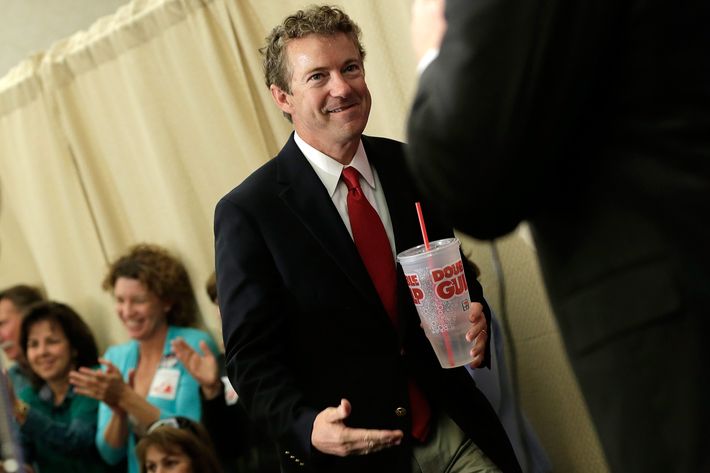
This weekend, the Supreme Court, by its customary 5-4 partisan split, issued an emergency ruling upholding Republican-authored voter-identification laws in Texas. The Texas law, like other legislation resembling it elsewhere, imposes disproportionate burdens on poor and nonwhite voters — or, as the Republicans hope, non-voters.
Meanwhile, in what feels like unrelated news, Republicans continue to rack their brains for ideas to increase their share of the minority vote. Whatever could they do to convince these nonwhite Americans that the Grand Old Party has their best interests at heart? Rand Paul and Chris Christie, reports the Daily Beast, recently appeared at a Republican confab on Fifth Avenue, where they jostled to position themselves as the Party’s true hope for diversification. Earlier this spring, Paul tentatively questioned his party’s obsession with rooting out almost entirely imaginary voter fraud, but almost immediately retracted his heresy. (“I agree, there’s nothing wrong with [voter I.D. laws],” he told Sean Hannity. “To see Eric Holder, you’ve got to show your drivers license to get in the building. So I don’t really object to having some rules for how we vote.”) Christie has opposed measures to make voting easier, like same-day registration and early voting. They have a two-track approach to the minority vote: make it as hard as possible for them to vote, while simultaneously persuading those who do vote to vote for them.
The Republican Party’s strategy of making voting as difficult as possible is borne out of the correct observation that impediments to voting disproportionately ward off Democratic-leaning constituencies. It is true that anybody is legally entitled to obtain the identification needed to comply with Republican-mandated voting requirements. But poor voters are much less likely to have such identification in the first place, and voting restrictions create additional bureaucratic hassles that they are the least equipped to handle. A recent report by Richard Sobel, of Harvard’s Institute for Race & Justice, tallied the cost of obtaining the required voter identification — the costs include the direct fee in obtaining identification, plus transportation, plus time. The costs usually range from $75 to $175, an exorbitant expense for a low-income person in order to do an activity that carries no direct personal benefit.
The report aptly presents voting restrictions as a modern form of the poll tax, which was outlawed in 1964. Indeed, the costs of contemporary voter I.D. requirements, even in inflation-adjusted terms, is many times the level of the poll taxes that existed before they were outlawed in 1964.
Republican efforts to restrict early voting have the same effect. Low-income workers have less flexibility in their jobs and less access to convenient transportation and child care. Extended weekend and evening voting hours ease that burden — which, like voting-identification laws, functions just like a poll tax. A boss or a manager or a married person or a retiree can more easily rearrange his or her schedule to make it to a polling station on a given Tuesday in November. A wage worker or a single parent might have a harder time.
Republicans tend to present voter-identification laws as a necessary deterrent to in-person voter impersonation, a virtually nonexistent crime. Whether Republicans genuinely fear vote fraud, or have used it as a cynical pretext, is an irrelevant question. Humans have a remarkable capacity to develop moral justifications for our perceived self-interest.

But the Republican crusade to limit early voting places conservatives in an awkward position. The conservative movement has invested enormous energy into the task of convincing their adherents that in-person fraud is pervasive, a feat they have accomplished through relentless fulmination on the subject, and sometimes by committing actual voter fraud. This massive propaganda campaign has supplied conservatives with ample reasons to justify to their satisfaction with the Party’s crusade for purported anti-fraud laws, like voter-identification requirements. It has left a relative dearth of justifications for restricting early voting, which matters just as much. Into this chasm steps National Review’s John Fund, a leading agitator for Republican vote-suppression policies, who has a column arguing against early voting as well. Fund’s column frets that early voting has made us “redefine ourselves as a nation of convenience voters and abandon one of the only remaining occasions on which Americans come together as a nation to perform a collective civic duty.”
Fund offers several reasons why more convenient early and weekend voting presents a danger to the Republic (as opposed to the Republican Party, whose partisan interest he does not mention).
1. The strongest argument Fund musters is to warn that letting people cast a vote early would prevent them from being influenced by late-breaking campaign developments, like news of George W. Bush’s 1976 DUI arrest. The counterpoint is that undecided voters who need every precious day of campaign news to make up their mind, after months and months of campaigning, can always choose to wait until the last moment before casting their vote, rather than being forced to do so by being given just one day.
There is actually a perfect solution that would address Fund’s professions of deep social commitment to a single national voting day while also addressing concerns about the inconvenience. You’d simply have to make Election Day a national holiday. Sadly, Fund — who does not mention this idea in his most recent article — has previously dismissed it on the grounds that creating a holiday on a Tuesday would lead to people skipping work on the preceding Monday. (It “might do little more than create a de facto Saturday to Tuesday four-day weekend,” he wrote, in 2005.) So that’s out, too.
2. Fund also argues that holding elections on a single date is a Constitutional requirement, or at least sort of Constitutional-ish:
The notion of Election Day isn’t just a tradition; it’s in the Constitution. Article II, Section 1 states that “Congress may determine the Time of choosing the Electors, and the Day on which they shall give their votes; which day shall be the same throughout the United States.” Congress codified this requirement in 1872 by setting a uniform presidential election date.
If you read this passage slowly, you will note the progressive deterioration of Fund’s argument. The first sentence asserts baldly that a single election day is “in the Constitution,” which sounds like, you know, a requirement. This raises the question of why Republicans have not mounted a successful constitutional law challenge against early voting.
The answer begins to reveal itself in Fund’s second sentence. It explains that the Constitution states that Congress “may” — but not must — set a uniform day for “choosing the Electors,” which is not the same thing as voting, anyway. (You could choose the electors on a single day after you count all the votes, which may be cast over a longer period of time.)
The final sentence points out, correctly, that there was no set day until Congress decided to create one in 1872, which is another way of saying that a single day when everybody votes is not in the Constitution at all.

3. Fund argues that voting shouldn’t be convenient because fast food is convenient and fast food can be unhealthy:
There’s no doubt that many people in our increasingly mobile and hectic society want voting to be as easy and convenient as buying fast food. But too much of anything can be bad — just ask someone who has gorged on drive-thru burgers and fries.
One really does not know what to say here. Yes, people want voting and fast food to be easy and convenient. They want this for everything. People also like access to potable water to be easy and convenient. Perhaps this is an actual principle for Fund, who may have once experienced an episode of hamburger-gorging so humiliating, it left him with the misplaced but genuine belief that society must deliberately make convenient tasks more onerous, and he will soon propose that we eliminate indoor plumbing and go back to hauling water from the well with jugs. Alternatively, he merely favors government regulations that impose difficulty and inconvenience upon the public in this one way that happens to benefit the Republican Party.
According to the Daily Beast, Christie and Paul want to reassure voters “who view the Republican Party through the lens of its anti-civil-rights past.” Actually, the Republican Party’s past record on civil rights is not so bad. It’s the present that is the problem.
Update: Hendrik Hertzberg, whose work on political reform has deeply influenced me, writes to add some depth to point number two. Here’s Hertzberg:
Article II, Section 1 states that “Congress may determine the Time of choosing the Electors, and the Day on which they shall give their votes; which day shall be the same throughout the United States.”
Here’s my reading of this, which doesn’t exactly contradict yours but makes your case even stronger.
The “time of choosing the electors”—“time,” not “day”—refers to the span of time (one day, several days, three weeks, whatever) during which, as it says in Article II, Section 2, “Each State shall appoint, in such Manner as the Legislature thereof may direct, a Number of Electors…”
Appoint, not elect. And in any way the legislature likes. Could be popular election, could be by the legislators themselves, could be dart board.
The antecedent of “they” and “their” in “the Day on which they shall give their votes” is “the Electors,” who have previously been chosen and who go to the state capital to “give their votes” on the same day “throughout the United States,” thus supposedly preventing them from interstate intrigues based on which way the wind is blowing in other states.
As you say, “a single day when everybody votes is not in the Constitution at all.” But Fund was incorrect in suggesting that Congress was codifying a Constitutional “requirement” when it legislated a uniform election day in 1872. Congress was merely recognizing that since every state legislature had by then decided to choose their states’ electors by popular election, the relevant date was no longer the day on which the electors “give their votes,” it was the time span, however short or lengthy, during which the electors were chosen.
If you get my pedantic drift.






























